Before the Storm (41 page)
Authors: Rick Perlstein

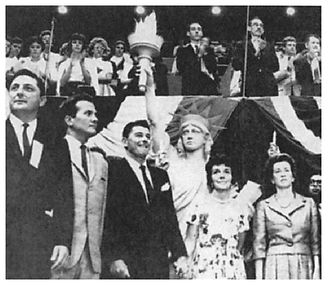
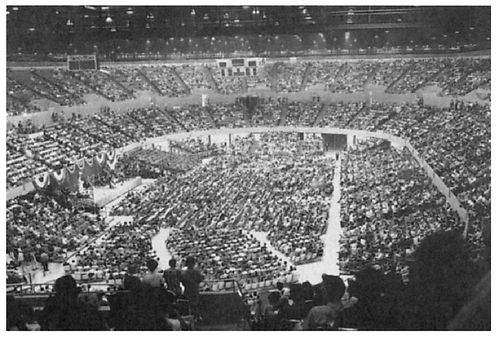
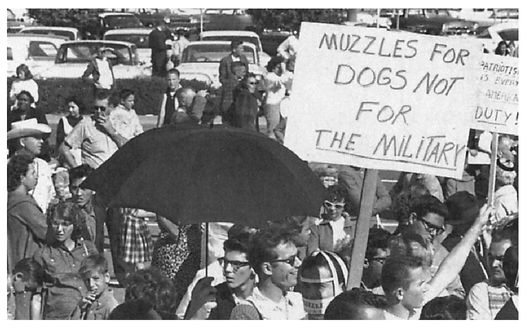
The center of far-right activity was southern California, especially suburbanOrange County. Here, during a John F. Kennedy speech, marchers protest on behalf of Edwin Walker, an Army general censured for telling his troops that the loyalty of figures such as Harry Truman and Dean Acheson was suspect.
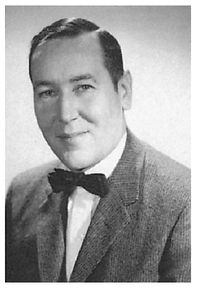
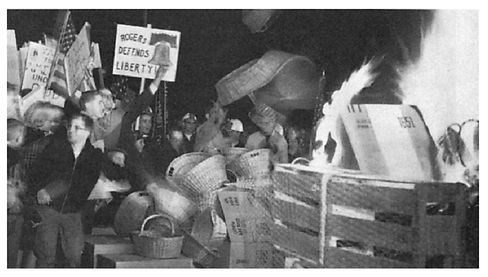
F. Clifton White (left) stealthily organized the disciplined network that gave Barry Goldwater the Republican nomination in 1964. Still, he was kept busy policing right-wing fringe groups given to activities such as burning baskets alleged to have been manufacturedbehind the Iron Curtain, as in the case of this Indiana YAF chapter (above).
The divorced Nelson Rockefeller was the hands-down favorite for the Republican nominationâuntil he married a woman twenty years his junior and was labeled an accessory to child abandonment. The incidentlaid bare many of the day's unspoken assumptions about gender and morality.
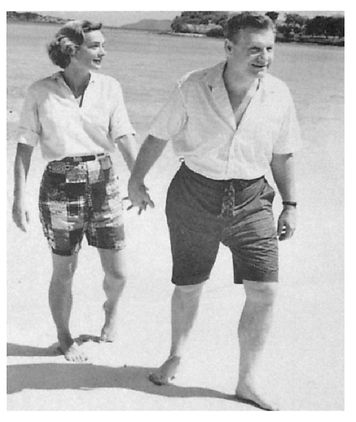

George Wallace became the face of violence in September 1963, after the Klan bombing of a Birmingham, Alabama, church that killed four little girls. When John F. Kennedy was assassinatedtwo months later, many Americans blamed Goldwater for helping to foment a violent mood in the nation.
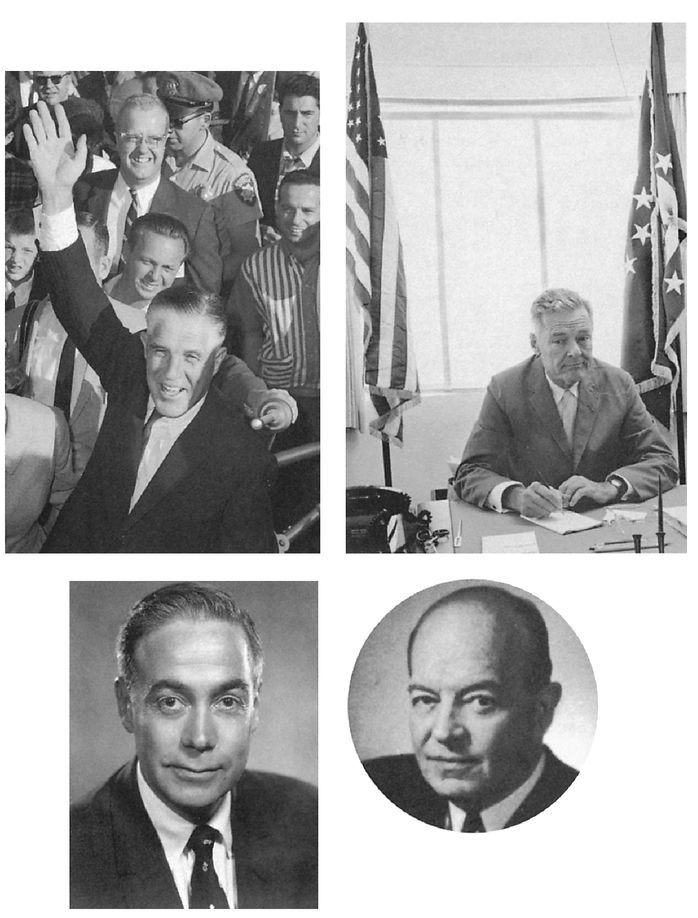
With Goldwater apparently out of contention for the nomination, moderateRepublicansâincluding, clockwise from top left, George Romney, Henry Cabot Lodge, Harold E. Stassen, and William Warren Scrantonâput themselves forward, or were put forward, as alternatives.
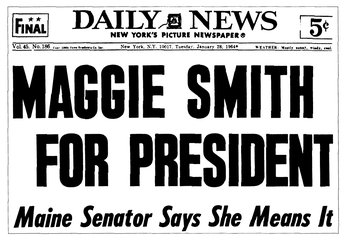
None of the moderates entered the race with more enthusiasm than Maine senator Margaret Chase Smith. The first female major-party presidential candidate in history was soon drowned in ridicule and condescension.
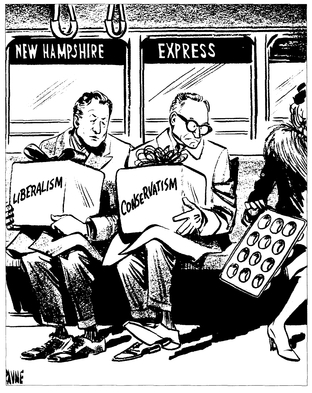
“A rising tide lifts all boats,” the nation's sailor-president liked to say, the implication being that there
could be
no intractable problems in booming America. Most of the problems the country faced, he had recently told the policy intellectuals of the Brookings Institutionâwho, as staffers at the epicenter of the doctrine of managerial expertise, could only agreeâ“are technical problems, are administrative problems.” Those few writers who demurred were spending most of their energy begging people to just open their eyes. Three masterpieces of left-wing social criticism appeared around the same time in bookstores in 1963: in
The Other America
Michael Harrington argued forcefully that there appeared to be little poverty in the United States because in the United States poverty was
hidden;
Betty Friedan's
The Feminine Mystique
said women were miserable because they could not call out their problem's name; and a book by Rachel Carson on the subtle, progressive degradation of the environment was called
Silent Spring. National Review
mobilized the same tropes every time it argued that the big-government liberalism Americans took most for granted was exactly the thing that should be at issue. Or when another Catholic-bred existentialist, Tom Hayden, wrote in 1962, in the (ignored) manifesto of Students for a Democratic Society, that America's purported consensus might “better be called a glaze above deeply felt anxieties.”
The Fire Next Time,
the black author James Baldwin entitled an eye-opening collection of essays on race in America; few were aware there was even any kindling on the ground.
could be
no intractable problems in booming America. Most of the problems the country faced, he had recently told the policy intellectuals of the Brookings Institutionâwho, as staffers at the epicenter of the doctrine of managerial expertise, could only agreeâ“are technical problems, are administrative problems.” Those few writers who demurred were spending most of their energy begging people to just open their eyes. Three masterpieces of left-wing social criticism appeared around the same time in bookstores in 1963: in
The Other America
Michael Harrington argued forcefully that there appeared to be little poverty in the United States because in the United States poverty was
hidden;
Betty Friedan's
The Feminine Mystique
said women were miserable because they could not call out their problem's name; and a book by Rachel Carson on the subtle, progressive degradation of the environment was called
Silent Spring. National Review
mobilized the same tropes every time it argued that the big-government liberalism Americans took most for granted was exactly the thing that should be at issue. Or when another Catholic-bred existentialist, Tom Hayden, wrote in 1962, in the (ignored) manifesto of Students for a Democratic Society, that America's purported consensus might “better be called a glaze above deeply felt anxieties.”
The Fire Next Time,
the black author James Baldwin entitled an eye-opening collection of essays on race in America; few were aware there was even any kindling on the ground.
In his annual one-hour interview with
CBS Reports,
Walter Lippmann, the seventy-two-year-old dean of American pundits, ran down the tenets of the consensus as if reciting a catechism: the Soviet bloc was to be lamented, but it was nothing “so dangerous to the United States that we can afford to burn up the world over it,” and could be contained “magnanimously, patiently and with restraint”; Castroism could be kept from South America by curing its nations' backwardness and illiteracy through foreign aid; budget deficits would vouchsafe economic growth; the Republicans' “only hope is to be able to convince the country that they can do substantially what Kennedy is trying to do, only do it better.” For in America “the pull to the center is very strong.”
CBS Reports,
Walter Lippmann, the seventy-two-year-old dean of American pundits, ran down the tenets of the consensus as if reciting a catechism: the Soviet bloc was to be lamented, but it was nothing “so dangerous to the United States that we can afford to burn up the world over it,” and could be contained “magnanimously, patiently and with restraint”; Castroism could be kept from South America by curing its nations' backwardness and illiteracy through foreign aid; budget deficits would vouchsafe economic growth; the Republicans' “only hope is to be able to convince the country that they can do substantially what Kennedy is trying to do, only do it better.” For in America “the pull to the center is very strong.”
Other books
Hot Licks by Jennifer Dellerman
Everything Happened to Susan by Malzberg, Barry
Hearts of Gold by Catrin Collier
Spirit Horses by Evans, Alan
Sue by Hawkinson, Wodke
The Mask: A Vanessa Michael Munroe Novel by Taylor Stevens
Difficult Run by John Dibble
The Silver Chain by Primula Bond
Doctor's Love (BWWM Pregnancy Romance) by Violet Jackson